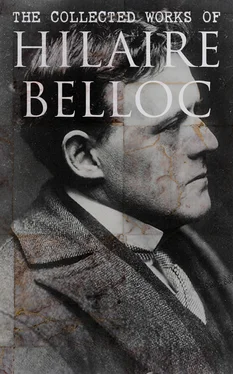LECTOR. You were at the uninteresting remark that the heat was increasing.
AUCTOR. Precisely. I remember. Well, the heat was increasing, but it seemed far more bearable than it had been in the earlier places; in the oven of the Garfagnana or in the deserts of Siena. For with the first slopes of the mountain a forest of great chestnut trees appeared, and it was so cool under these that there was even moss, as though I were back again in my own country where there are full rivers in summer-time, deep meadows, and all the completion of home.
Also the height may have begun to tell on the air, but not much, for when the forest was behind me, and when I had come to a bare heath sloping more gently upwards--a glacis in front of the topmost bulwark of the round mountain--- I was oppressed with thirst, and though it was not too hot to sing (for I sang, and two lonely carabinieri passed me singing, and we recognized as we saluted each other that the mountain was full of songs), yet I longed for a bench, a flagon, and shade.
And as I longed, a little house appeared, and a woman in the shade sewing, and an old man. Also a bench and a table, and a tree over it. There I sat down and drank white wine and water many times. The woman charged me a halfpenny, and the old man would not talk. He did not take his old age garrulously. It was his business, not mine; but I should dearly have liked to have talked to him in Lingua Franca, and to have heard him on the story of his mountain: where it was haunted, by what, and on which nights it was dangerous to be abroad. Such as it was, there it was. I left them, and shall perhaps never see them again.
The road was interminable, and the crest, from which I promised myself the view of the crater-lake, was always just before me, and was never reached. A little spring, caught in a hollow log, refreshed a meadow on the right. Drinking there again, I wondered if I should go on or rest; but I was full of antiquity, and a memory in the blood, or what not, impelled me to see the lake in the crater before I went to sleep: after a few hundred yards this obsession was satisfied.
I passed between two banks, where the road had been worn down at the crest of the volcano's rim; then at once, far below, in a circle of silent trees with here and there a vague shore of marshy land, I saw the Pond of Venus: some miles of brooding water, darkened by the dark slopes around it. Its darkness recalled the dark time before the dawn of our saved and happy world.
At its hither end a hill, that had once been a cone in the crater, stood out all covered with a dense wood. It was the Hill of Venus.
There was no temple, nor no sacrifice, nor no ritual for the Divinity, save this solemn attitude of perennial silence; but under the influence which still remained and gave the place its savour, it was impossible to believe that the gods were dead. There were no men in that hollow; nor was there any memory of men, save of men dead these thousands of years. There was no life of visible things. The mind released itself and was in touch with whatever survives of conquered but immortal Spirits.
Thus ready for worship, and in a mood of adoration; filled also with the genius which inhabits its native place and is too subtle or too pure to suffer the effect of time, I passed down the ridge-way of the mountain rim, and came to the edge overlooking that arena whereon was first fought out and decided the chief destiny of the world.
For all below was the Campagna. Names that are at the origin of things attached to every cleft and distant rock beyond the spreading level, or sanctified the gleams of rivers. There below me was Veii; beyond, in the Wall of the Apennines, only just escaped from clouds, was Tibur that dignified the ravine at the edge of their rising; that crest to the right was Tusculum, and far to the south, but clear, on a mountain answering my own, was the mother of the City, Alba Longa. The Tiber, a dense, brown fog rolling over and concealing it, was the god of the wide plain.
There and at that moment I should have seen the City. I stood up on the bank and shaded my eyes, straining to catch the dome at least in the sunlight; but I could not, for Rome was hidden by the low Sabinian hills.
Soracte I saw there--Soracte, of which I had read as a boy. It stood up like an acropolis, but it was a citadel for no city. It stood alone, like that soul which once haunted its recesses and prophesied the conquering advent of the northern kings. I saw the fields where the tribes had lived that were the first enemies of the imperfect state, before it gave its name to the fortunes of the Latin race.
Dark Etruria lay behind me, forgotten in the backward of my march: a furnace and a riddle out of which religion came to the Romans--a place that has left no language. But below me, sunlit and easy (as it seemed in the cooler air of that summit), was the arena upon which were first fought out the chief destinies of the world.
And I still looked down upon it, wondering.
Was it in so small a space that all the legends of one's childhood were acted? Was the defence of the bridge against so neighbouring and petty an alliance? Were they peasants of a group of huts that handed down the great inheritance of discipline, and made an iron channel whereby, even to us, the antique virtues could descend as a living memory? It must be so; for the villages and ruins in one landscape comprised all the first generations of the history of Rome. The stones we admire, the large spirit of the last expression came from that rough village and sprang from the broils of that one plain; Rome was most vigorous before it could speak. So a man's verse, and all he has, are but the last outward appearance, late and already rigid, of an earlier, more plastic, and diviner fire.
'Upon this arena,' I still said to myself, 'were first fought out the chief destinies of the world'; and so, played upon by an unending theme, I ate and drank in a reverie, still wondering, and then lay down beneath the shade of a little tree that stood alone upon that edge of a new world. And wondering, I fell asleep under the morning sun.
But this sleep was not like the earlier oblivions that had refreshed my ceaseless journey, for I still dreamt as I slept of what I was to see, and visions of action without thought--pageants and mysteries--surrounded my spirit; and across the darkness of a mind remote from the senses there passed whatever is wrapped up in the great name of Rome.
When I woke the evening had come. A haze had gathered upon the plain. The road fell into Ronciglione, and dreams surrounded it upon every side. For the energy of the body those hours of rest had made a fresh and enduring vigour; for the soul no rest was needed. It had attained, at least for the next hour, a vigour that demanded only the physical capacity of endurance; an eagerness worthy of such great occasions found a marching vigour for its servant.
In Ronciglione I saw the things that Turner drew; I mean the rocks from which a river springs, and houses all massed together, giving the steep a kind of crown. This also accompanied that picture, the soft light which mourns the sun and lends half-colours to the world. It was cool, and the opportunity beckoned. I ate and drank, asking every one questions of Rome, and I passed under their great gate and pursued the road to the plain. In the mist, as it rose, there rose also a passion to achieve.
All the night long, mile after mile, I hurried along the Cassian Way. For five days I had slept through the heat, and the southern night had become my daytime; and though the mist was dense, and though the moon, now past her quarter, only made a vague place in heaven, yet expectation and fancy took more than the place of sight. In this fog I felt with every step of the night march the approach to the goal.
Long past the place I had marked as a halt, long past Sette Vene, a light blurred upon the white wreaths of vapour; distant songs and the noise of men feasting ended what had been for many, many hours--for more than twenty miles of pressing forward--an exaltation worthy of the influence that bred it. Then came on me again, after the full march, a necessity for food and for repose. But these things, which have been the matter of so much in this book, now seemed subservient only to the reaching of an end; they were left aside in the mind.
Читать дальше












